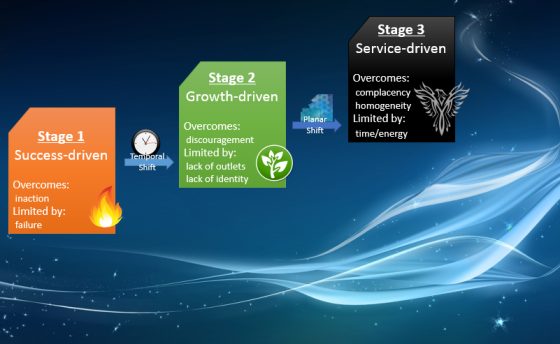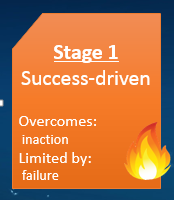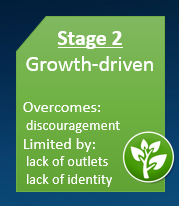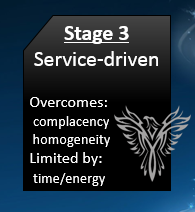Motivation is temporal. Good music, a cup of coffee, or a great TED talk could make you feel inspired, pumped up, and raring to go – but give yourself a couple of setbacks, and that same source of inspiration might start to feel like a toy hammer against a two-tonne rock. You’ll need something way more powerful than a short spurt of energy to break down the barriers in your way.
Stages of Drive
I like to think of motivation in terms of stages. Each stage represents evolutionary growth in our personalities, in the very core of our beings – and that can be ultimately reflected in the way we are driven. Getting to the next stage means that we are motivated by a new kind of desire; a new purpose or meaning forms the foundation for our actions, and a new force gives us power to overcome the unsurmountable. This motivating energy is fundamentally different between stage to stage, and I imagine it to be on a hierarchical scale: higher stages present more sustainable and powerful energy, while lower stages burn brightly at first, but wear off just as quickly, especially in the face of challenges. And challenges are aplenty when we are engaged in any worthwhile pursuit, so if we don’t transcend to the next stage fast enough, we may not be able to persist in our mission!
Driven by Success
In the first stage, success is motivated by success. Our drive to get things done is derived from the feel-good sensation of having seen success in either someone else, or ourselves. That’s why inspiring TED talks, tales of exemplary people in their field, or even a sports game can cause us to be fired up about our own projects. We see great people swinging their hammers of accumulated ability and smashing apart boulders with seemingly effortless ease, and we think to ourselves – hey, we could be like that too. So we pick up our own tiny hammers and take up our own quests. We embark on our creative projects, our ambitious routines, our competitive journeys. When we succeed for the first time, the dopamine rush makes us feel great; it makes us want to repeat the fantastic experience. The more fortunate ones of us may get to see longer stretches of success than others, and for as long as our season of victory continues, we may believe that we have finally found the holy grail to this game of life. We have no trouble waking up in the morning, swiping aside any sort of negativity, and getting on with our day – smashing problems to smithereens left, right, and center.
But soon enough, regardless of talent or chance, we may meet with an unexpected failure. Our book launch fails. We miss a scheduled exercise session. The competitor trumps us decisively. We feel horrible, and the negative thoughts are harder to swipe off each morning. At first, we may try to block off the hard feelings by listening to more inspiring talks, watching more incredible wins, telling ourselves about how we have attained the gold medal before, and how we can do it again. Temporarily, we are fired up. We keep at our quests. We keep breaking boulders. Yet, the experience of negativity is inevitable: the harder we try, the more we expose ourselves to failure. Each experience of failure makes the naive part of us realize that all the buzz associated with doing well is only just fairy dust and butterflies – it’s not substantial enough to take us all the way to the top. Eventually, that link between our quest and the feel-good, dopamine-rush of success gets completely rend asunder; to truly complete our quest, we conclude that it is essential to go through the dirt, the mud, and the thorn vines. There are no shortcuts. We don’t feel quite as excited anymore. For some of us, this critical realization makes us want to give up – which may not always be a bad decision. But for the rest of us who really, really want to turn our visions into reality, we become obsessed with the question: how do I keep myself motivated? How do I persist beyond the sting of failure?
The First Transition
To do that, we’ve got to change our focus. I call this the temporal shift, because we take our eyes away from short-term, feelings-driven, self-indulgent motivation to a longer-term, vision-centered drive. We stop thinking about how an activity makes us feel good, but we think of how our vision and mission is important to us. We focus on that vision more than the temporary good-feels that a short streak of success gives us. This means that we are okay with not feeling okay. In fact, we begin to embrace failure – it is just part of the process of growing. By focusing on the longer term mission instead of the shorter term feelings and sensations, we have made the first transition.
Driven by Growth
Once we’ve made the temporal shift, our eyes are set on higher things. We are no longer motivated by the sweetly deceptive allure of success, but instead, we continue bravely, exposing ourselves to difficulties – difficulties that could lead to even more failure. It may be terrifying, yet we quell our fears and press on. This vision that we have is so important, so captivating, that we begin to learn how to take the failure in stride. We except it like how we except the cycles of night and day, the seasons of spring and summer. We learn how to make it work for us instead of against us.
Indeed, in order to achieve what we can imagine, we must accept that growth is absolutely essential. We hit against strong boulders and they do not break because we do not have the right tools, technique, or strength. Failure and mistakes are now re-framed – instead of being the horrible, unacceptable parts of our quest, they become guiding lights, homing beacons, signposts; information that guides us to the very tools we need to move or break the barriers in our way.
To be quite frank though, making mistakes alone is no road to victory. Neither is it a pleasant experience. Just because we’ve switched our motivation does not mean that the bitter fruit is no longer bitter. No, it is still inimically bitter, but we eat it to get better. We are incensed, incentivized, and inspired to study all our losses with greater diligence and alacrity. We know that this is the only way to learn. No, we do not make mistakes with pleasure, nor derive perverse joy from falling each and every time in battle – our senses are still preserved and our tastes are still refined.
What we do is to let the failures guide our path away from more failure. We still feel the sting of defeat and the pain of a thrashing, so we would still prefer to take a victory over a loss at any time. But we are now more resilient, we are more patient, and we can deal with the pain long enough to discover the new pathways that we can take to grow. We do that by managing our negative emotions, and engaging in quiet reflection and contemplation. Moving from post-defeat pity to (not overly-detached! but) fully-engaged reflection is an evolution of character. Doing so will give us critical insights that can bring us closer to victory road. Through continuous reflection and adjustments, we avoid past mistakes and repeat what works until we know what each situation calls for, until we develop confidence in our own skills and abilities. In other words, it is through mistakes that we are pushed towards acquiring a bigger, better hammer, and it is through reflection, application, and correction upon re-correction that we learn to possess it.
The end goal for us is no longer that temporary sense of satisfaction, but the stable sense of growth – a pursuit of excellence, a mature, resilient motivation – an unshakable knowing that our selves have grown to the point that we can acquire satisfaction more easily than before, indeed to the point where we no longer worry about it. Give a man a large hammer and he may learn to break rocks. Teach a man to forge his own, and all the rocks of the world are for his breaking.
And yet, there is an end to this stage. There is a cliff that we reach, a path that we can no longer easily traverse on foot. The block here is yet another negative feeling. We’ve worked so hard in the past, dusted our knuckles against the rocks, plumbed the depths of our soul for the inspiration to continue against seemingly unbeatable odds, but now that we’ve gotten so far, there is a creeping shroud of uneasiness that begins to overtake us. We start to feel soft, saggy, stagnated. Things that were difficult for us are now easy. We look for the next peak to scale, but it feels like way too much effort. We want to stay here. We want to bask in our worn-out glory, lay in our half-baked success (because half-baked is good enough for us), and stay unperturbed by the forces of change.
But, if the bit of us that first discovered the beauty of our vision still remains somewhere deep within, we will feel that creeping shroud of uneasiness with greater sensitivity. It will permeate our beings and cause us to be unable to laze with serenity. No, we are plagued with a relentless invasion of ennui – we know that we must strive harder. But to what ends, and for what purposes? We tell ourselves that we are satisfied, though, if we were really honest, there is still something not quite complete about our success. Right at where we are at, there is a danger of being ensnared by stagnation, bogged down by boredom, and goaded into the same goals as everyone else. Our projects may be unique, but they seem like just another dime in a pile of so many. Our routines may feel effective, but it’s still someone else’s, stolen from the net somewhere. Our victories are sure, but only because we copied the strategies of another. We are successful, we have overcome failure, but we have yet to find our voice. And that is the thing that bugs us, that is the thing that irritates us, yet it feels insufficient to motivate us forward. We need to get to the next stage, and fast.
The Second Transition
So far, we have only striven for ourselves. We’ve put ourselves through the furnace to look for gold within, we’ve traversed the path of peril to seek treasure without, we smith and re-smith stronger hammers to bash the boulders in our way – but things get too difficult past a certain point. Things may even just get too boring. So what gives us the push – or to put it another way, what sucks us through to the other side? Whatever it is will have to be a higher, transcendent purpose. We need to take our eyes off ourselves, and stop asking for what we can gain from it. We need to start looking at the bigger picture. What can we give? Who can we serve? How do we reach that state of evolved strength that enables us to smash the boulders in other people’s way? Previously, we made a temporal shift, a vital change in perspective from short to long-term. Now, we must make a planar shift, to cease looking at the small area of space that we know as ourselves, and to begin setting our gaze on the wider world. Our perspective must be enlarged, it must grow to encompass not just the people we naturally care about, but also the people whom we don’t yet know, people whom we could one day serve.
Driven by Service
First we were motivated by success, and then by growth. Now, with a stable, empowered self, we make a planar shift, peer out of our shells, and feel compassion for the world around us. At this third stage, we are motivated by service. We have more than enough to share, and we want to give it to where it is needed most. This is, of course, the ideal. Usually, upon venturing out into the world, we may instead learn that our current skill set is not enough to meet the ever-growing demand. Or we may realize that it is not sufficiently fine-tuned for it to be effective. This gap is what draws us forward. It sucks us into a continuum of growth, and makes us able to bear with the days of darkness and desperation up ahead – day that can and will come when we delve deep enough into self-development of all sorts. We may feel lost, we may feel like we want to give up – but when we compare our miniscule pain with the colossal ache of the world, we know for sure that it is only a small price to pay for so great a cause.
Some of us may end up at the other deep end of self-development: complacency. When we get lazy and proud, it is the ones whom we serve who can shake us out of it. Our complacent blindness will lead us to fumble, hopefully in a small way, and immediately, the effects of our mistake reverberate throughout the ecosystem of our influence. Things break down. Systems fall into minor jeopardy. People may get hurt (but hopefully not). All at once, we remember how others need us to be at our best. All at once, we get up, stretch our muscles, and get ready to bust more rocks. There is no time for plateauing when we are service-focused, when our sense of self has grown to include others. We cannot idle in complacency or despair – there are lives and livelihoods at stake. We are pushed off the cliff, and we learn to grow wings.
And as we move out into the world and interact with people – those who can help us and those whom we can help – we are driven towards the deeper ‘why’s’ of doing. Our motivation sheds its selfish outer shell and reveals a vulnerable, humane person within, a person whose heart bleeds for the common cause, and whose hands work to raise others up. At this stage of development, we acquire new facets to our abilities. Previously, our analytical skills helped us grow through failure. By reflection and correction we learn the right path. Now, they show us how our actions can influence or fail to influence others. They show us if our skills are lacking, and whether they are in need of further refinement. On the upside, we also become aware of what works, and what doesn’t; what deserves more time and energy, and what is just a waste of investment. With an expanded sense of self, all the abilities that we’ve developed to understand ourselves become redirected to understand others and our relation to them, transforming us into people who can serve the world effectively.
This can, in many ways, create a distinctive marker in our personal skill sets, helping us to find a unique voice in a sea of so many. It seems like anyone who works hard enough can be a writer, but a writer who writes for gamers, or cooks, or musicians, has found a niche. Extending this to a humanitarian direction brings us to entrepreneurs whose interaction with less fortunate groups drive them to penetrate poverty zones through deftly-organized aid ministries, innovators whose exposure to the countless number in want of a clean drink every morning lead them to discover new ways of creating potable water, and social workers who, when faced with unending demands for skilled attention, use their mastery in technology to multiply the effect of the few on the field. Anybody who puts in the hours, and intelligently grinds through failure after failure, should be able to achieve a fair degree of success, but it is our unique connections to those we interact with, to those whom we feel for, that defines the nature of our expertise, and adds colour to our wings.
As a caveat, we must be careful not to skip steps here. There are many martyrs in this world whose kindness and selflessness are exemplary and admirable. But they remain ineffective in their fields of service, or they may even succumb to the same oppression that they seek to fight against. Why does this happen? Usually, they may have moved straight to stage 3 – the demands of the world around them were so pressing that they had no freedom to develop their strengths first. As such, when challenges come in greater numbers, they cannot care for both themselves and others.
Sometimes, we may be in such a situation because of circumstances. But when given the choice, we should strive to develop in a sound and sequential manner. We need wings before we can save others who are falling, we need a great hammer to smash our boulders, then those of others. While we should not be afraid to step out and serve, neither should we be tempted to rush the pace of our development. Through patience, we grow steadily, accumulate ability, and become a powerful force in whatever field we find ourselves in.
If we do manage to reach this stage without rushing too quickly or hesitating for too long, then our motivation becomes akin to the perpetual motion devices of lore – those around us catalyze our growth as we dedicate the fruits of our labour to serving them. We are inspired, and we inspire, we are motivated and we motivate. Our drive is strong enough to break down all the personal barriers in our way. By now, the only thing that blocks us are the logical limits, things like time and energy. These are things that we can only increase to a certain extent. From there, we will aim for optimal investments of these limited resources. At this stage, we become concerned with fine-tuning, experimentation and achieving the best returns from what little we have. This is a problem that demands constant attention and focus – yet it is a good problem to be dealing with. Because having broken down all the barriers of drive from Stage 1 to Stage 3, we can now look up and gaze into the clear skies for the first time. And that’s when we consider: perhaps, what lies beyond is the limit.






